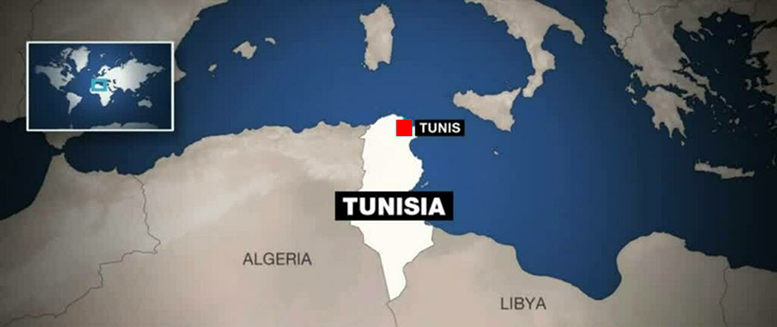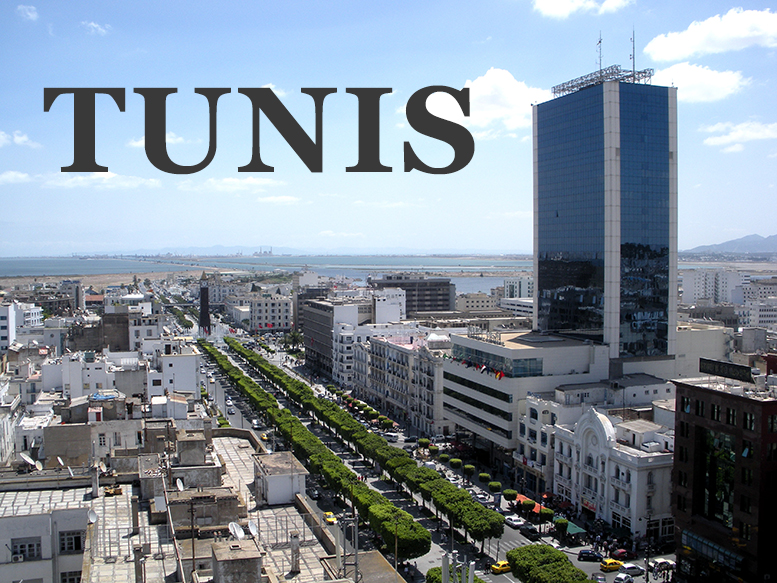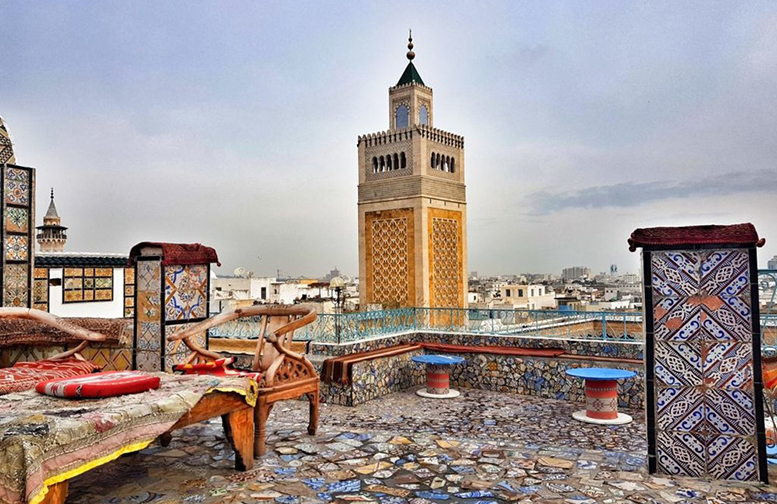Tunisia - Leading The Way
By following a progressive socio-economic agenda, Tunisia has been able to emerge as one of the fastest growing economies in Africa

Tunisia has a 98 per cent Muslim population and Arabic is its official national language. In recent yeards, the country's relentless march towards a first world economic status shows no signs of abating. If anything, the pace is quickening. GDP growth this year is expected to hit the 6 per cent mark. Following an average growth rate of around 5 per cent for the last decade, this is a remarkable performance, especially for a country with few natural resources.
Like
Mauritius, the other star in Africa's economic firmament,
Tunisia is reaping the rewards of its heavy investment
in human resources. Like Mauritius, it is using the skills
of its people to make things for which there is a high
 international
demand. Unlike Mauritius however, Tunisia is situated
right in the heart of its principal market - the European
Union - to which it sends around 80 per cent of its exports.
Goods from Mauritius, on the other hand, which is located
far out in the middle of the Indian Ocean, have to make
the long haul to Europe and then push out even further
to reach the United States. It is this proximity to Europe
which is the key to Tunisia's economic thrust. But proximity
on its own means nothing ? as witness Tunisia's neighbours
in the Maghreb. It is making this proximity count that
has transformed this North African country of nine million
into a regional power house.
international
demand. Unlike Mauritius however, Tunisia is situated
right in the heart of its principal market - the European
Union - to which it sends around 80 per cent of its exports.
Goods from Mauritius, on the other hand, which is located
far out in the middle of the Indian Ocean, have to make
the long haul to Europe and then push out even further
to reach the United States. It is this proximity to Europe
which is the key to Tunisia's economic thrust. But proximity
on its own means nothing ? as witness Tunisia's neighbours
in the Maghreb. It is making this proximity count that
has transformed this North African country of nine million
into a regional power house.
Pragmatic, thoroughly thought out policies, and the energy and determination to carry them through, lie at the heart of Tunisia's success. Under the leadership of President Zine El Abidine Ben Ali, every factor that could have slowed down or impeded the country's development was thrown into the rubbish bin; everything that enhanced development was nurtured and encouraged. The result has been remarkable political stability in a volatile region, the highest per capita income and the best literacy rate in Africa, easily the most qualified workforce on the continent and a superb, modern infrastructure.

Tunisia: Attracting Business to Africa
Given such a fertile soil, it is hardly surprising that some 2,000 international companies have taken root in Tunisia. This year alone, the country expects to attract another $600 million worth of foreign direct investment. This industrial muscle, added to the thousands of world-class Tunisian enterprises, equals an African Singapore in the making. Tunisia's immediate goal is to be fully prepared for the 2008 free trade zone agreement with the EU. This entails two separate challenges. The first is to upgrade, modernise and increase physical infrastructure and the second, perhaps more important, is to raise human performance levels.
Both strands of the strategy are well under way. Tunisia today is a hive of furious activity. At least 45 major construction projects, with a value of around $4.6 billion, are either well advanced or nearing completion. Avenue Mohamed V in Tunis, an elegant avenue with old-world charm, is being transformed into a modern commercial artery with glittering high-rise office blocks. A new, ultra-modern all-purpose stadium is taking shape and will be completed in time for the 14th Mediterranean Games later this year. A large new marina is also approaching completion at the tourist resort of Hammamet. Scores of other projects, including flats, office buildings, factory shells, shopping malls, hotels and leisure facilities such as golf courses are under construction up and down the country. As you travel around Tunisia, the phrase ‘building the future' takes on literal meaning.
The country is preparing itself for the larger volume and faster pace of economic activity that the EU agreement will entail. The Tunis-Carthage International airport has already been expanded and road and rail networks are increasing steadily. Berthing space and port facilities are undergoing continuous upgrading. Today, there are 166 weekly flights to Europe and 20 sea-going departures. Traffic by land, sea and air will increase year by year until 2008 but the country's transport authorities are confident they will have the capacity to deal with whatever volumes come their way. The benchmark for a country's economic development is the state of its telecommunications. There is not much point in building massive infrastructure if people cannot communicate easily, cheaply and effectively. All business, at the end of the day, is the result of person-to-person communication.
Tunisia Marches Ahead
Tunisia
is one of the few developing countries to place such a
high priority on the state of the environment and land
development. Clear-sighted policies and a vigorous application
of regulations have resulted in Tunisia enjoying the status
of the cleanest  country
in the southern Mediterranean. Apart from the positive
impact this has on health and tourism, it could become
a crucial competitive element when international environmental
regulations begin to bite in the near future. The current
international manufacturing giants, China, Taiwan and
Hong Kong are way behind in environmental management.
Unless they can get their environmental act together,
they could easily find themselves losing large chunks
of their present very lucrative markets. Investment will
then be forced to look for environmentally friendly manufacturing
bases. Tunisia has thus neatly placed itself in the front
row of such bases.
country
in the southern Mediterranean. Apart from the positive
impact this has on health and tourism, it could become
a crucial competitive element when international environmental
regulations begin to bite in the near future. The current
international manufacturing giants, China, Taiwan and
Hong Kong are way behind in environmental management.
Unless they can get their environmental act together,
they could easily find themselves losing large chunks
of their present very lucrative markets. Investment will
then be forced to look for environmentally friendly manufacturing
bases. Tunisia has thus neatly placed itself in the front
row of such bases.
So much for preparing the ground for the great economic leap forward. What about the human factor? Is the average Tunisian willing and able to live in the fast lane? The answer, according to the World Bank, is a qualified yes. Tunisia's investment in education is one of the highest in the world. Some 92 per cent of six to 12 year-olds attend school. Women now form a vital segment of the skilled workforce. The universities produce 1,000 engineers every year. There are 30 vocational training centres and seven institutions of higher vocational training.
Skilled Workforce
The combination of these factors has produced easily the most skilled and best qualified workforce in Africa (even including Mauritius) - and one of the best in the southern Mediterranean. More significantly in terms of international competitiveness, the cost of labour is lower than in countries which are Tunisia's main economic rivals. For example, the total cost per minute for a textile manufacturer in France is 28 US cents; in Tunisia, the same manufacturer making exactly the same product will pay only 10 cents. In Portugal, one of Tunisia's main rivals, the manufacturer will pay 13 cents. A difference of three cents per hour on a turnover of several million dollars per month can amount to a king's ransom. No wonder virtually every household brand name, from Adidas to Volkswagen, has a presence in Tunisia.
Interestingly, lower labour costs do not translate into lower standards of living. On the contrary, Tunisia has a higher proportion of middle classes compared to other low-cost producers such as Turkey, the Czech Republic, Poland, Hungary and Portugal. A home-ownership rate of 78.2 per cent of the population is higher, by far, than all the others.
Tunisia's spectacular economic growth is a classic case of how to turn disadvantages into opportunities. The lack of natural resources meant that unlike other Maghreb countries such as Libya and Algeria, there were no ready-made sources of income.
Since there were no windfall revenues from unexpectedly high commodity prices, there was no incentive to squander money on prestige projects or indulge in grandiose international gestures.
The result is that Tunisia's foreign debt is negligible and it has been able to pay all its commitments promptly. Thus, unlike the majority of African countries, it has not needed heavy-handed IMF or World Bank interventions and has been able to chart its own development course rather than have to swallow prescriptions imposed from outside.
The fact that virtually half of the country is desert has made Tunisians highly appreciative of their green areas. They have husbanded the fertile soil with extreme care to ensure sustainability. The result is that the country today is virtually self-sufficient in food. Plans to increase agricultural output without putting additional strains on the soil are already in process. The Ministry of Agriculture is confident that over the next five to six years, food output will not only meet total demand, but there will also be a surplus for export.
Given these natural constraints on economic growth, Tunisia put all its chips on developing human resources. It was a gamble that has paid off handsomely. But it has not been simply a case of throwing money at education, creating a friendly climate for investors and hoping for the best. It took clear, cool planning and the establishment of a state machiney to ensure that policy would be translated into reality on the ground.

Connecting Africa to Global Business Chain
The roots of Tunisia's achievements lie in accurately forecasting future international trends. The country realised the implications of globalisation well before many others. It could see not only that markets were becoming more international but that the entire production process itself was being internationalised. The era of nationally based production and consumption was coming to an end. Tunisia realised that tariffs and other artificial barriers would, sooner or later, have to go. Products would compete only on quality and price, not where they were made.
Here the Tunisians saw their opportunity. If they could position themselves to become low-cost, high-quality producers, they had the chance to rub shoulders with the big boys in the industrial world. Their geographic position, at the hub of the European, Arab and African worlds, was their one great advantage over competitors. But to gear up the country to become a major industrial player required a wholesale transformation of society. It had to be a 'quiet revolution' and it had to be planned with meticulous care. Several unconnected strands, such as the empowerment of women, the increase of disposable incomes, the building up of domestic capital, the creation of new infrastructure, the training and retraining of the workforce, the projection of a positive media image abroad and, above all, the psychological change from conservatism to competitiveness had to be developed separately and then brought together like pieces of a jigsaw puzzle to form the complete picture. Preparation has been the key.
Today, the picture is almost complete, but some pieces still have to be slotted in. Tunisia has indeed become a substantial industrial player - industrial exports last year accounted for around 80 per cent of exports. Textiles alone contributed around 50 per cent of exports. Now Tunisia has embarked on enlarging its international market share. It recently organised a very well-attended exhibition and trade fair for its textiles in Britain. These forays into hitherto non-traditional markets are predicted to continue over the coming years and, as the markets increase, so will the productive capacity. This in turn will create more jobs, more disposable income, more domestic consumption and the cycle of prosperity will continue to corkscrew upwards. The flurry of construction activity is yet another piece of the jigsaw about to slot into the picture. Tunisia is preparing for an even better tomorrow.
Previous Next


